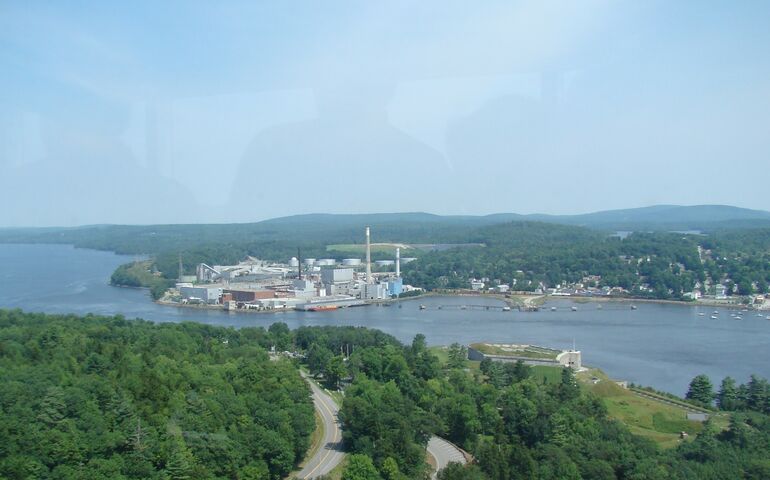The state has granted two submerged land leases to Whole Oceans LLC, which will allow the Portland-based aquaculture company to begin underwater work on a salmon farm at the former Verso Paper mill site in Bucksport.
While the company owns the 104-acre site, the state owns the adjacent submerged land, so the leases are necessary for Whole Oceans to begin underwater work on the site. The leases, administered by the state Bureau of Parks and Lands, allow existing structures, like outfall and intake pipe, below the mean water line to be maintained and repaired.
The leases are in effect for the next 25 years, and under state law can be renewed.
Whole Oceans has a lease on 4,488 square feet of riprap along the shore and a little more for an outfall pipe. The total area of the submerged lands lease for While Oceans is 6,348 square feet, with some of that owned jointly with Bucksport Mill LLC. That portion covers a second outfall pipe that is used by both entities, according to Jim Britt, spokesman for the Maine Department of Agriculture, Conservation and Forestry, which oversees the bureau.
The annual lease fee for the Whole Oceans portion is $584.11; for the portion leased to Whole Oceans LLC and Bucksport Mill LLC, the amount is $150.
The outfall pipes and riprap were already in place and were used by the mill. Whole Oceans has not added any submerged structures, Britt said.
Excavation and new construction is still subject to permit from the Department of Environmental Protection and U.S. Army Corps of Engineers. The work includes removing pipe and water storage tanks and excavating. Once the permits are granted, the first stage of the project will include demolishing underground foundations and piping and water storage tanks, removing ledge and soil and grading of the site in preparation for the hatchery, affecting about 22 acres, according to Whole Ocean’s permit application with the state.
“We are excited to continue to make progress towards breaking ground on the project,” Jacob Bartlett, CEO of Whole Oceans, said in a news release. “The company is currently hiring people with decades of industry experience for leadership positions such as our new hatchery manager, Orfa Cabrera, as well as planning for construction.”
The Bucksport Planning Board approved company’s application for the salmon farm at the site Sept. 3, contingent on the company getting other permits for the project. Whole Oceans has said that once completed, the farm will be one of the largest aquaculture sites in the world.
Whole Oceans owns 104 acres at the in-town site on Main Street, which is Route 15, along the Penobscot River. The company plans to build a land-based Atlantic salmon recirculating aquaculture system in a phased development that at full build-out will have 945,000 square feet of building area, 1.372 million square feet of impervious area and 1.43 million square feet of total developed area. The build-out is expected to take 10 years.
While the company plans to redevelop about a million square feet of the former mill site, only 65,000 square feet will be new development, John Whitten, of CES Inc., representing Whole Oceans, told Mainebiz last month. The mill, which opened in 1930 and expanded in 1975, closed in 2014.
The DEP permit application says the project will include water supply and wastewater treatment systems with new connections to domestic water and sewer lines, including a freshwater supply line from Silver Lake; upgrades to the salt water intake pump system; reconnection to discharge pipes in the Penobscot River; and new water treatment and wastewater treatment systems.
The $75 million first phase of development is expected to provide capacity for growing 5,000 metric tons, or 11 million pounds, of Atlantic salmon. Once fully operational, the expected capacity will be double that amount.
